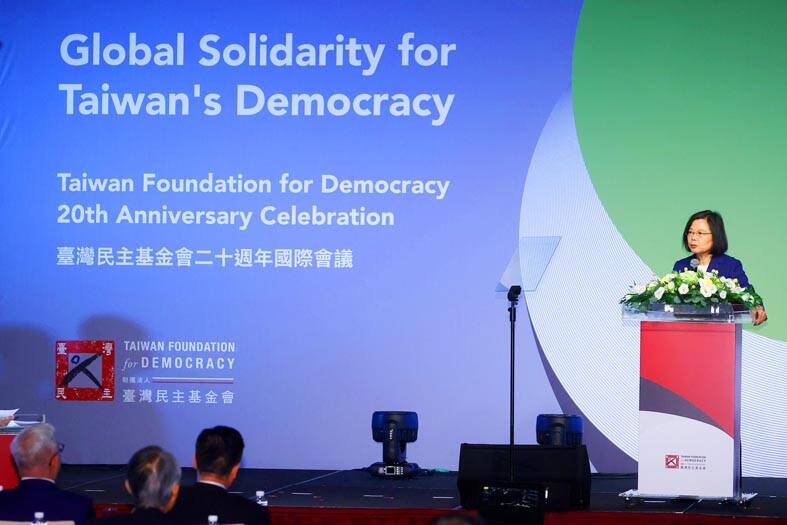Taiwan would confront the destabilizing forces working against democracies while strengthening cooperation with democratic nations, President Tsai Ing-wen (蔡英文) said in Taipei yesterday at an event marking the 20th anniversary of the state-financed Taiwan Foundation for Democracy.
Democratic nations and the rules-based international community are confronting their “greatest challenge” since the Cold War, Tsai said.
Authoritarian regimes are mounting an effort to “corrode our democratic institutions and undermine human rights” in a bid to spread societal distrust and weaken public confidence in democracy, she said.

Photo: CNA
Taiwan is familiar with these efforts since the nation has long been exposed to Beijing’s threatening military exercises, economic coercion, cyberattacks and disinformation campaigns, she added.
Taiwanese are unbowed against the challenge of authoritarianism and fight it each day to preserve their democratic way of life, Tsai said, urging the world’s democracies to cooperate against the common threat.
“If we want to meet this challenge, we must work together as democracies to counter the tactics that authoritarian regimes use to undermine our institutions,” she said.
Legislative Speaker You Si-kun (游錫?), who is chairman of the foundation, said Taiwanese must recover their democratic spirit to protect national sovereignty and democratic institutions from the authoritarian onslaught.
The nation did not obtain its vaunted status of being a democratic exemplar as a gift from the heavens, but through the “blood and tears” of democracy pioneers, he said.
The sphere of democracies has receded in a worrying trend over the past decade, with Beijing imposing its National Security Law on Hong Kong and the Russian invasion of Ukraine, You said, adding that democracy is declining globally according to Freedom House’s rankings last year.
The attacks on freedoms by authoritarian regimes and the failure of democratic consolidation are both to blame for the setbacks dealt to democracies across the world, he said.
Taiwan’s democracy is threatened by “military intimidation from the Chinese Communist Party (CCP) externally, coupled with challenges arising from a historical legacy of authoritarian party-state education and cognitive warfare carried out by the CCP within Taiwan,” You said.
A free people with the will to defend themselves is the ultimate foundation of national defense and Taiwan must rediscover its democratic spirit to be truly secure, he said, calling for a global stance for freedom.
You expressed Taiwan’s solidarity with Ukraine, adding that both nations are on the front line of the struggle against authoritarianism and that Taiwanese would also defend universal values with their lives.
US National Endowment for Democracy president Damon Wilson, who presented Tsai with the endowment’s Democracy Service Medal, said China’s bid to coerce Taiwan is “part of a broader global assault on democracy.”
Defending freedom requires a coordinated and focused response from democracies, he said, adding that the world must stand in solidarity with Ukraine in its fight against Russian aggression and Taiwan’s efforts to protect its democracy.
At the same, Taiwanese should be mindful that “democracy is [their] security,” Wilson said.
“As Taiwan deepens its democracy at home, it bolsters its own security,” he said.

INVESTIGATION: The case is the latest instance of a DPP figure being implicated in an espionage network accused of allegedly leaking information to Chinese intelligence Democratic Progressive Party (DPP) member Ho Jen-chieh (何仁傑) was detained and held incommunicado yesterday on suspicion of spying for China during his tenure as assistant to then-minister of foreign affairs Joseph Wu (吳釗燮). The Taipei District Prosecutors’ Office said Ho was implicated during its investigation into alleged spying activities by former Presidential Office consultant Wu Shang-yu (吳尚雨). Prosecutors said there is reason to believe Ho breached the National Security Act (國家安全法) by leaking classified Ministry of Foreign Affairs information to Chinese intelligence. Following interrogation, prosecutors petitioned the Taipei District Court to detain Ho, citing concerns over potential collusion or tampering of evidence. The

Seventy percent of middle and elementary schools now conduct English classes entirely in English, the Ministry of Education said, as it encourages schools nationwide to adopt this practice Minister of Education (MOE) Cheng Ying-yao (鄭英耀) is scheduled to present a report on the government’s bilingual education policy to the Legislative Yuan’s Education and Culture Committee today. The report would outline strategies aimed at expanding access to education, reducing regional disparities and improving talent cultivation. Implementation of bilingual education policies has varied across local governments, occasionally drawing public criticism. For example, some schools have required teachers of non-English subjects to pass English proficiency

‘FORM OF PROTEST’: The German Institute Taipei said it was ‘shocked’ to see Nazi symbolism used in connection with political aims as it condemned the incident Sung Chien-liang (宋建樑), who led efforts to recall Democratic Progressive Party (DPP) Legislator Lee Kun-cheng (李坤城), was released on bail of NT$80,000 yesterday amid an outcry over a Nazi armband he wore to questioning the night before. Sung arrived at the New Taipei City District Prosecutors’ Office for questioning in a recall petition forgery case on Tuesday night wearing a red armband bearing a swastika, carrying a copy of Adolf Hitler’s Mein Kampf and giving a Nazi salute. Sung left the building at 1:15am without the armband and apparently covering the book with a coat. This is a serious international scandal and Chinese

TRADE: The premier pledged safeguards on ‘Made in Taiwan’ labeling, anti-dumping measures and stricter export controls to strengthen its position in trade talks Products labeled “made in Taiwan” must be genuinely made in Taiwan, Premier Cho Jung-tai (卓榮泰) said yesterday, vowing to enforce strict safeguards against “origin laundering” and initiate anti-dumping investigations to prevent China dumping its products in Taiwan. Cho made the remarks in a discussion session with representatives from industries in Kaohsiung. In response to the US government’s recent announcement of “reciprocal” tariffs on its trading partners, President William Lai (賴清德) and Cho last week began a series of consultations with industry leaders nationwide to gather feedback and address concerns. Taiwanese and US officials held a videoconference on Friday evening to discuss the